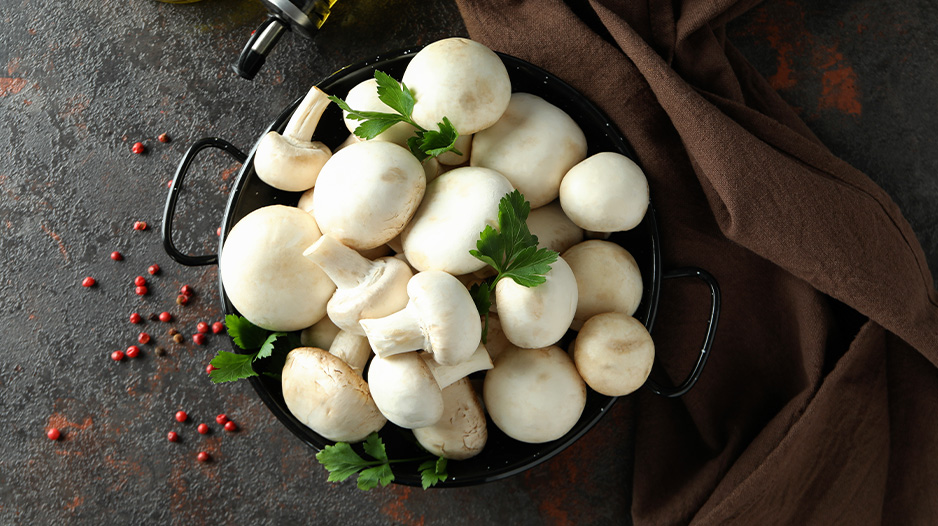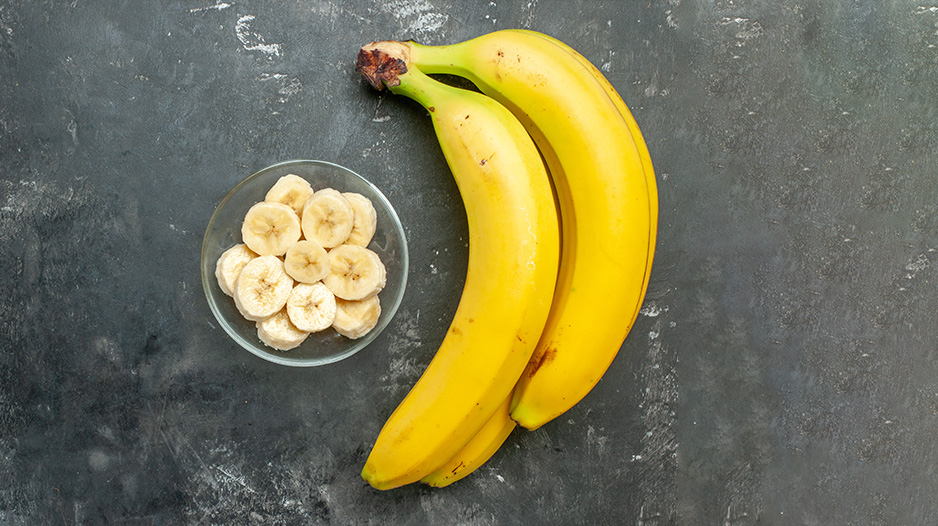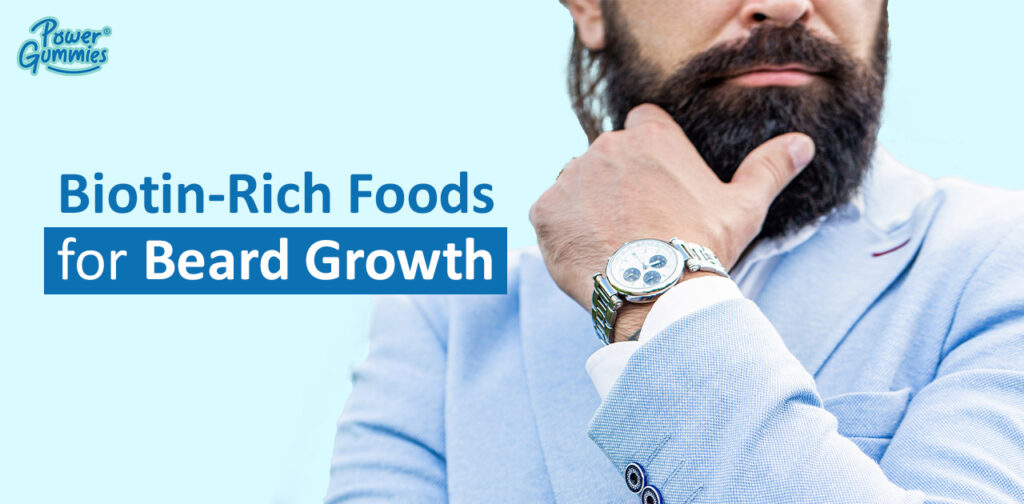Hair loss is one of the arising problems seen mostly in men. This can happen due to many factors such as genes, hormones, or an unhealthy lifestyle too. When it comes to your lifestyle, it includes your diet as well. The food you eat and the nutrition you receive from them are quite important in boosting your hair as well as beard growth.
Also, there’s an important vitamin named Biotin that plays an important role in enhancing your hair and beard growth. For those who are unaware of what Biotin is- it’s one of the B Vitamins. Biotin helps in strengthening, thickening and growing your hair. It is even required for your nails. Biotin is a water-soluble vitamin, meaning that the body cannot store significant amounts, therefore it must be consumed regularly in the diet.
You can consume it in the form of supplements or it’s present in many foods that you can consume regularly in your meals. Consuming foods such as bananas, sunflower seeds, mushrooms, or sweet potatoes can contribute to promoting hair and facial hair growth.
Know more about these foods by scrolling below…
1. Mushrooms

These nutrient-rich fungi have so many health benefits. They’re a great source of selenium, magnesium, and antioxidants. They are a rich source of biotin, with each cup of fresh button mushrooms providing 5.6 micrograms of biotin.
Mushrooms can taste great with noodles, homemade pizzas, sauces and gravies. You can even add them to salads, stir-fries, sandwiches, or hearty winter soups. Mushrooms have a high biotin content, which actually protects them from parasites and predators in the wild.
2. Yeast
Brewer’s yeast, also known as active yeast, is used to make bread and beer. This contains a decent amount of biotin. A standard 2.25 teaspoon or 7-gram packet of active dry yeast used for baking provides ¼ micrograms of biotin. Nutritional yeast is used in many vegan cheeses and non-dairy substitutes and it also contains Biotin. There are 21 micrograms in every two-tablespoon serving of nutritional yeast. If you’re not sure how to use it, think of it somewhat like a Parmesan cheese substitute. Sprinkle it on salads, pasta dishes, soups, or even popcorn.
3. Bananas

Not many fruits will hook you up with biotin, but bananas can surely get you a small dose. One small banana (105 grams) provides about 0.2 micrograms of biotin or 1 percent of the daily value. Bananas are also full of fibre, carbohydrates, and micronutrients like B vitamins, copper, and potassium, so there are plenty of other benefits to consider.
4. Almonds
Almonds are a good source of biotin, with 1.5 micrograms per quarter cup. Almonds also provide healthy monounsaturated fats and omega-3 fatty acids, which reduce inflammation and support heart health. They also contain Vitamin E, another essential nutrient for hair and skin health.
You can boost your biotin dose by pairing almonds with another biotin-rich food, such as oatmeal. If you prefer to go the trail mix route, combine almonds with peanuts, which provide about 0.8 mcg of biotin per serving.
5. Legumes
The majority of legumes, such as beans, lentils, peanuts, and soybeans, are a great source of biotin. They also provide complex carbohydrates, plenty of fibre, prebiotics, and iron. Peanuts and soybeans contain an abundance of biotin in this group.
For example, a 28-gram serving of roasted peanuts contains nearly 5 micrograms of biotin, which is 17% of the recommended daily value. When considering soybeans, there is a whopping 19.3 mcg of biotin per ¾ cup which is 64% of the daily value.
6. Sunflower Seeds
Seeds are also frequently considered superfoods, as they provide an array of key vitamins, minerals, and essential fats. Sunflower seeds are an excellent source of biotin. Each ¼ cup or 20-gram serving of roasted sunflower seeds provides 2.6 micrograms of biotin, which is roughly 10% of the recommended daily value.
Another good option for seed lovers is Hemp seeds, which also provide a lot of fibre, and minerals such as calcium, magnesium, phosphorus, iron, zinc, and copper. Moreover, they are a rich source of biotin as well.
7. Egg Yolks
Eggs are one of nature’s little packages of vital nutrients. Eggs are packed with B Vitamins as well as other good stuff like protein and iron. The yolk is a rich source of biotin, and a whole, cooked egg provides about 10 micrograms of biotin, which is approximately 33 percent of the daily value. An egg is also a complete source of protein, meaning it contains all essential amino acids.
Egg yolks are also rich in Vitamin D, a fat-soluble vitamin that plays an important role in bone health, along with iron, which helps transport oxygen in the blood to every cell and tissue in the body. Ensure that you do not eat raw eggs as this can have a negative impact on your biotin absorption. Raw eggs contain a protein called avidin that restricts biotin absorption in the body.
8. Sweet Potatoes
Sweet potatoes are packed with nutrients such as vitamin A, beta-carotene, vitamin C, fibre, potassium, copper, and magnesium. They are also one of the best sources of biotin. There are 2.4 micrograms of biotin per ½ cup of cooked sweet potato which is around 8% of the recommended daily value.
Along with vitamin A in sweet potatoes, which is also good for the eyes and skin, the biotin makes sweet potatoes a superfood for skin health. You can enjoy sweet potatoes baked, microwaved, steamed, roasted, mashed, spiralized, grilled, or even with rice.
9. Avocados
Avocados are rich in unsaturated fats and folate. Besides this, they are also a good source of Biotin. Consuming them can help you in providing your body with some amount of Biotin. An avocado weighing around 200 grams is enriched with around 1.85 micrograms of the B vitamin- Biotin.
This actually supplies around 6% of the daily intake value. You can consume these avocados raw or can even make salads out of them. They can be mashed as well and put on toast as a spread.
10. Spinach
Remember how many of you didn’t like eating spinach but had to because of your mom? Well, you would be amazed to know that this leafy vegetable actually promotes your biotin intake which is responsible for your hair and beard growth. Apart from being rich in biotin, spinach also supplies you with Vitamin C, A, iron, folic acid as well as calcium. Consuming just 64 grams of spinach can provide you with 5 micrograms of biotin!
To Conclude
Your diet is responsible for your outer appearance too. Biotin, a vital vitamin is necessary for the growth of the hair on your head as well as your food. Thus, consuming foods that have an abundance of Biotin can be helpful in growing your beard. Apart from eating the above-recommended foods, you can even give beard growth gummies a try.
You can hence pick up the “Dapper Hair & Beard” gummies. These gummies provide you with the required Biotin along with other elements such as Fenugreek Seed Extract, Beta-Sitosterol, Folic Acid, Vitamins, and Minerals. You know consuming just two of them during the day can prevent a receding hairline, promote regrowth, and even vitalize your hair follicles making your beard grow faster.

